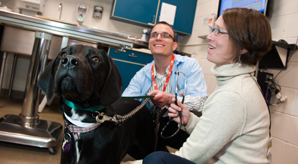

The holiday season is just around the corner and brings with it all the joys of baking special treats, cooking traditional favorites, decorating the home, and celebrating with family, friends, and colleagues. For pets, the holidays also bring some health risks that can be avoided. With some simple precautions, you can keep your pet healthy and ready to welcome the New Year.
While we humans anticipate the holidays and enjoy spending time with loved ones and friends, our pets may be unaccustomed to the additional activity in their home. Some pets enjoy the extra attention they receive (especially extra petting and more play partners), while others may become more anxious or tire quickly and want solitude. You are the best judge of your pet’s comfort in social situations, but it helps to plan ahead and provide a safe environment. During parties and family gatherings, you can shelter your pet in a quiet room equipped with bedding, food, water, and toys. Cats like a place to hide, but be sure they have access to their litter box. Help decrease surrounding noise by playing music or turning on the TV. Check on your pets often and provide them frequent bathroom breaks.
Make sure all Halloween, Thanksgiving and Christmas decorating materials are out of reach. Some cats especially like string or tinsel from Christmas trees which is hazardous if ingested. Some pets like to drink out of the Christmas tree basin, which often contains toxic substances. Be aware, too, that some seasonal plants, such as ivy, holly, and mistletoe are poisonous to our pets. For a complete list of toxic plants, visit www.hsus.org. Consuming foreign materials can cause your pet gastrointestinal upset, toxicity, pancreatitis and/or serious gastrointestinal complications that may require trip to the emergency room and even surgery.
Many human foods, especially richer holiday cuisine, are not meant for animal consumption and can cause mild to severe illness if eaten. You may need to remind your guests not to feed your pet human food (no matter how sad those brown eyes look). Also, be sure not to leave wrapped food under the tree. Many pets have happily eaten a pound of fudge from Aunt May, only to wind up with a night in the emergency clinic. Watch out for “counter surfers,” too, who take the opportunity to feast when no one is looking. Some potentially dangerous items used in holiday cooking include:
Every animal reacts differently and not all poisoning require the same treatment. If your animal has ingested something that is potentially harmful, contact your veterinarian immediately. Have your veterinarian’s phone number readily available, as well as a number for emergency and/or after-hours veterinary service. You can also contact the National Animal Poison Control Center at (888) 426-4435. Keep your pet safe, and enjoy a wonderful holiday season.